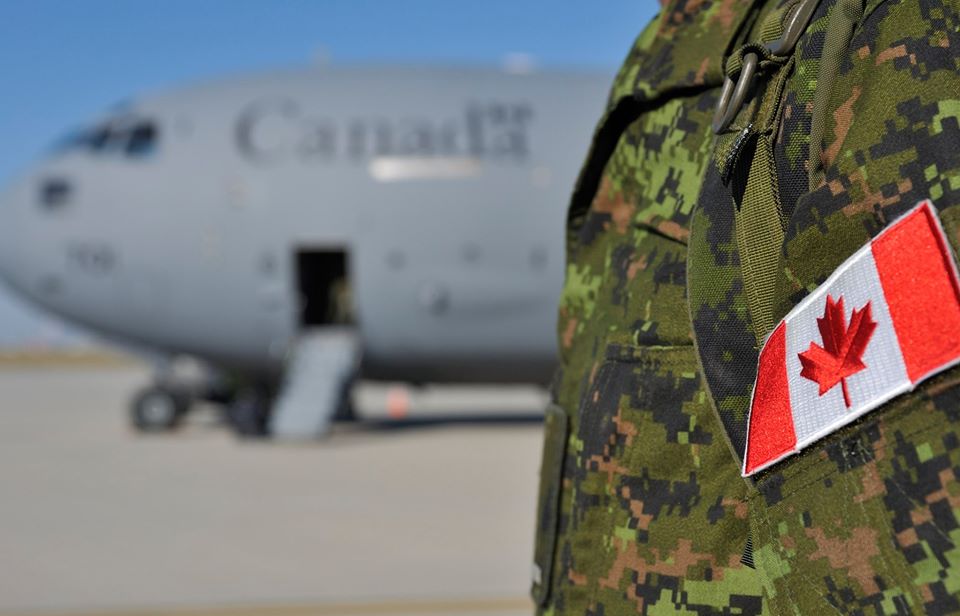Canada News
Canadian troops in Ukraine face uncertainty due to COVID-19 crisis

The Canadian Armed Forces “is currently assessing whether the relief in place of forces will proceed as planned given the implications COVID-19 is imposing upon the force,” Capt. Alexia Croizer of the Canadian Joint Operations Command told The Canadian Press in an email. (File photo: Canadian Armed Forces/Facebook)
OTTAWA — The COVID-19 crisis has left 200 Canadian soldiers in Ukraine — and their families back home — in limbo as commanders weigh whether they should be replaced with new troops, kept in place for the time being or pulled out entirely until the pandemic subsides.
Canada has had military trainers in the eastern European country since the summer of 2015, during which time they have instructed around 17,000 Ukrainian troops in the basics of soldiering as well as some advanced skills such as first aid and explosives disposal.
The mission was launched after Russia annexed the Crimean peninsula in 2014 and started to support separatist forces in Ukraine’s eastern Donbass region in a war that has killed more than 10,000 and left tens of thousands more wounded and homeless.
The current Canadian contingent arrived in Ukraine in October and was supposed to be replaced by a new group next month, but those plans are now up in the air because of the COVID-19 pandemic.
The Canadian Armed Forces “is currently assessing whether the relief in place of forces will proceed as planned given the implications COVID-19 is imposing upon the force,” Capt. Alexia Croizer of the Canadian Joint Operations Command told The Canadian Press in an email.
“A decision by the CAF is expected shortly and will be communicated to members and families first and foremost.”
Defence chief Gen. Jonathan Vance this month ordered a halt to all non-essential military movement and activities to protect the force from COVID-19 while those involved in the training mission — like most Canadian troops deployed overseas — are on lockdown due to the pandemic.
The military’s “operational pause” was expected to last only three weeks, but in a letter to military personnel last week, Vance said Forces members must “face the reality” that it may last longer to prevent the spread of the novel coronavirus and the respiratory illness it causes.
Ukrainian public health officials reported 84 confirmed cases of COVID-19 in the country as of Tuesday, with three deaths. There were two confirmed cases in the western city of Lviv, near where some of Canadian troops are based.
Andriy Shevchenko, the Ukrainian ambassador to Canada, emphasized the importance of the training mission in an interview Tuesday, noting the war in the Donbass region continues to rage nearly six years after it first started.
At the same time, he said Ukrainian authorities are working on the understanding the troop rotation will go ahead next month.
“I think it’s up to our Canadian colleagues and their Ukrainian counterparts to come up with the best format,” he said. “Obviously there will be adjustments into the planned rotation, but we expect that this rotation will happen in April just like it was planned.”
One of the potential concerns facing Canadian troops overseas is the level of care they can expect to receive should they fall ill with COVID-19.
The provision of quality medical assistance to Canadian military personnel is a “high priority” for Ukraine, Shevchenko said, adding Ukrainian and Canadian military officials are looking at ways to resume the training mission while preventing the virus from spreading.
Retired lieutenant-general Marquis Hainse says Canadian commanders face a tough decision.
“I would not want our people to be exposed unnecessarily,” said Hainse, a former Canadian Army commander who now sits on the board of the Conference of Defence Associations Institute. “You have to ask yourself also: What are we accomplishing with that mission right now?”
At the same time, he said the training mission is important to both Canada and Ukraine and should the government decide to withdraw them, “what does that mean for our partners, the message that we send from an international point of view? We need to take this all in consideration.”
Whatever the decision, Hainse said his thoughts are with the families of Canadian military personnel deployed overseas who are having to deal with the COVID-19 crisis without their loved one at home.
“It is yet just another example of what we are asking our military families to go through and people sometimes do not recognize this fully.”





















